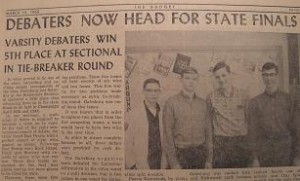Nate loved language. He read the dictionary for pleasure and used seventy-five cent words in everyday conversation. He was my personal walking, talking lexicon, and I loved asking him, “What’s that word? What does it mean?”
My husband never met a word he didn’t like. If he heard something new, he’d do exactly as all the grade school teachers instructed: use it in a sentence. One try at that and it was his forever. I recall the first time I ever asked him a word question. We were newlyweds, and he was in law school. When he referred to “becoming an attorney,” I asked, “What’s the difference between an attorney and a lawyer?”
“Nothing,” he said with a smile. “But that was a really cute question.” (Spoken like a man in love.) That was the start of forty years of word questions from me to him. Thankfully, he never criticized me for so much not-knowing.
In high school, Nate was the captain of the debate team (second from left), propelling his  classmates to excellence and a case full of trophies. Words were important, and he made it his business to learn all he could. As he studied the dictionary, he underlined words he needed to come back to, and made tiny notes in the margins. He memorized definitions, then quizzed himself year after year to be sure it all stuck.
classmates to excellence and a case full of trophies. Words were important, and he made it his business to learn all he could. As he studied the dictionary, he underlined words he needed to come back to, and made tiny notes in the margins. He memorized definitions, then quizzed himself year after year to be sure it all stuck.
He didn’t only enjoy English, though. He knew a smattering of all the romance languages and also Latin, the source of many English words. He also minored in college Russian and spoke it fluently. He used to say, “No, not fluently…” but whenever he ran into a native Russian, the two of them got lost in animated conversations the rest of us didn’t understand. One waitress and one hair cutter were particularly entranced by his interest in their language and loved to see him coming.
The other day as I was reading a morning devotional book, I came across a word I didn’t know and was frustrated I couldn’t just holler into the next room, “Nate, what does ‘abrogated’ mean?” Instead I had to go to the dictionary, a boring alternative to asking him . (It means to nullify or do away with something.)
I never really appreciated Nate’s massive vocabulary skills, at least not until now when I find myself hunting through the dictionary. He had a fantastic memory and seemed never to forget what he’d learned. We all looked up to him for his intelligence, and I don’t think I ever asked a question for which he didn’t supply the answer.
(But lest I give the impression he was perfect, he did destroy a toilet bowl trying to get rusted bolts loose with a hammer.)
We all have strengths and weaknesses. Nate took advantage of his love affair  with words by studying them and quizzing himself over and over. Language is important, and words run the world. But there are words, and then there is The Word, God’s definitive Word on all matters. Thankfully none of us needs an extensive vocabulary or a grasp on foreign language to be schooled by Scripture. The words on its pages concern matters of the heart, and since we all have one of those, its promises and words of eternal hope are meant for us all. To take full advantage of them, we don’t even need a dictionary.
with words by studying them and quizzing himself over and over. Language is important, and words run the world. But there are words, and then there is The Word, God’s definitive Word on all matters. Thankfully none of us needs an extensive vocabulary or a grasp on foreign language to be schooled by Scripture. The words on its pages concern matters of the heart, and since we all have one of those, its promises and words of eternal hope are meant for us all. To take full advantage of them, we don’t even need a dictionary.
“Your word is a lamp to my feet and a light for my path.” (Psalm 119:105)
[Jesus said,] “Heaven and earth will pass away, but my words will never pass away.” (Matthew 24:35)

Yeah Nate was talented in language and did he visit Russia or just got to know the language in the states. If he just learnt it in the state in impressed, because I can see to myself and say I wouldn’t been good at english if I hadn’t traveled to the states several times. You has become a big help in my English language.. THANKS!!
Hi Margaret, I enjoy learning new things about Nate through your blog. I grew up in a home where words were important and dictionaries were definitely well used. Thanks for sharing this today.
Judy
P.S. I have a Walgreens not too far from my house and whenever I drive past it I pray for you and the kids. That was a very touching blog, too.
A wonderful post and another great Nate-memory! He, indeed, did have a brilliant mind, and I enjoyed conversations with him, but I really belly-laugh when I think about the toilet incident. One of these days, you’ll have to do a complete post on the handyman theme.
Hi Margaret,
Nate would have done well at the Tower of Babel! Isn’t language a remarkable thing? See, I can say thing in a sentence, like “can you get me that thing?” and someone will know what I am talking about even while lacking specificity. One of the many ways we are set apart and uniquely created in His image, the Author, subsequent Confuser, and eventual Redeemer of the language of heaven.
How powerful indeed words are- they say the pen (even a Mont Blanc:)) is mightier than the sword. Except in one case, God’s pen is equal to His sword as they are one and the same. In the beginning was the Word, and all He had to do was speak to bring creation into existence (Hebrews 11:3). Just as the Holy Spirit hovered over creation, He hovered over Mary’s womb. God spoke and the Word became flesh (John 1:1,14). The writer of Hebrews says that in these last days God has spoken to us in His Son. And so it will be that in the end, just like the beginning, His Word will be all that is needed. The One Who is called the Word of God, will come back with a sharp sword in His mouth, and with “one little word” says the hymn, will fell Satan and the host of earthly armies encamped against Him (Revelation 19). Isaiah 11:4 says that just with “the breath of His lips He will slay the wicked.”
Behind His Word is THE WORD. I don’t want to be like the Pharisees who seemed to know their Scriptures, but did not know The Word. I want His Word to penetrate my heart and not just my head.
“Lord, establish Your Word to us so that it produces reverence for You. Let them become the joy and delight of our soul. Teach us to search Your Scriptures, so that we find it’s Author.”
Good words today, Margaret.
Love,
Terry